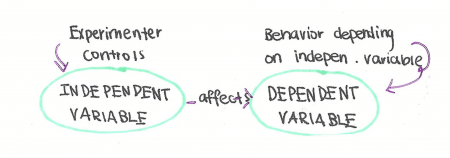Ginny, a curious student and pet owner, wants to know how fish oil can affect her dog’s skin. She has added fish oil to her dog’s diet and is now waiting to see the results after 3 months.
In the simple experiment above, what is the dependent variable? How about the independent variable?
The terms “independent variable” and “dependent variable” were introduced to us in school, however, many have forgotten what they mean. People who do not work in the science or math field may even consider them jargons, but these terms can actually help us look at ideas from a new perspective and even improve our problem solving skills. So what is the difference between independent and dependent variables? This will be discussed in this article.
Summary Table
| Independent Variable | Dependent Variable |
| In an experiment, it is a variable that is manipulated or controlled | In an experiment, it is a variable that is examined or observed |
| The “input” in a math equation | The “output” or the result in a math equation |
| There should only be one independent variable | There may be more than one dependent variable |
Definitions

In a scientific experiment, an independent variable is a variable that is altered or modified to examine the results of the dependent variable. In a mathematical equation, similarly, an independent variable is a value is that you can input to see how the dependent variable changes. For an accurate conclusion, there should only be one independent variable in an experiment.
On the contrary, a dependent variable is a variable that is being examined, studied or calculated in a scientific experiment. As the name implies, it is dependent on the independent variable as it responds to the changes made to the latter. In a mathematical equation, the dependent value is not manually entered, but is simply determined based on the independent value. In some experiments, there may be two or more dependent variables.
Now let us take a look at a few examples to better understand the difference between the two:
A) Scientific experiments:
- Jessica wants to know the effect of exercise in a person’s endorphin levels. Her independent variable would be exercise, and her dependent variable would be the endorphin levels of the subjects. She can take note of the changes in the endorphin levels as she controls the difficulty, frequency or type of exercise performed by the subjects. Jessica may also observe the effect of exercise on other dependent variables, like heart rate or weight. However, to be accurate, she should not add another independent variable, (for example, the amount of carbohydrates consumed by the subject). Doing otherwise will create confusion in the experiment.
- Mark is interested in how castor oil affects the growth of human hair. In this case, the independent variable would be the castor oil, while the dependent variable would be the human hair. The amount or type of castor oil applied can be manipulated to see how the changes affect the hair growth of the subjects. Mark can also check the quality of the hair, which in this case is another dependent variable, after castor oil is applied. To get a straight-forward result, he should not add another independent variable (such as aloe vera gel).
B) Mathematical Equations
- a + 4 = b (In this case, “b” is dependent on the value of “a,” the independent variable.)
- x = 8(y+2) – 7 (In this example, “x” is the dependent variable, while “y” is the independent variable. The value of “x” changes depending on your “y” input or value.)
Independent vs Dependent Variables
What, then, is the difference between independent and dependent variables?
In science and math, an independent variable is a variable or value that is changed, altered, or entered, while a dependent variable is a variable or value that is being observed. You may manipulate or control independent variable, but the dependent variable cannot be touched and can simply be examined.
To get an accurate result in a scientific experiment, an experimenter or researcher should only have one independent variable, but may have two or more dependent variables.





